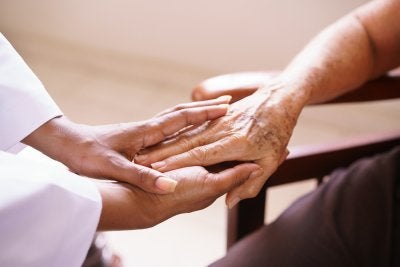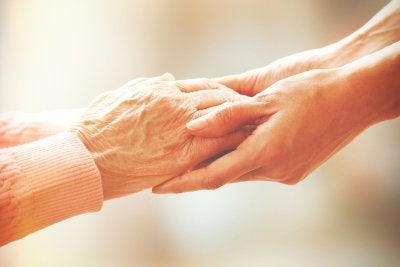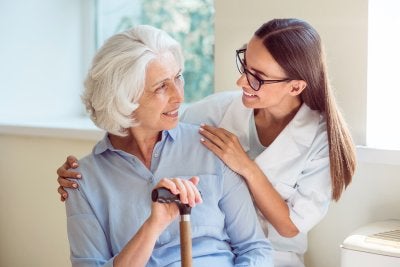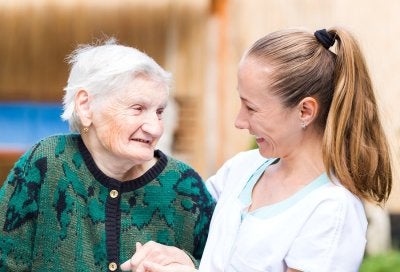-
When Is Hospice the Right Choice?
If you or a loved one has a terminal illness, it’s time to consider hospice care. This model of care has an undeserved stigma attached to it, but families who do choose hospice care near Memphis discover that it offers many benefits. Terminally ill caregiving is difficult for families to handle by themselves. Hospice opens up new possibilities for gracious and dignified living toward the end of life.

When Curative Treatments Aren’t Working
Modern medicine can work miracles, but sometimes, it just isn’t enough. Gravely ill patients do have the option of considering clinical trials when they have exhausted other treatment possibilities. But sometimes, clinical trials aren’t a possibility either if the patient isn’t eligible for them or there are no appropriate clinical trials being offered nearby. When medical treatments intended to cure the disease are no longer a feasible option, hospice care is a wise decision.
When Curative Treatments Do More Harm Than Good
Some patients have the option to choose curative treatments that are intended to extend life, but are not expected to cure the disease. For example, patients with advanced lung cancer might have access to some of the newer medications intended to give them a few more months of life. But not all patients want to take this route. Some curative treatments, especially for terminal illnesses like advanced cancer, can cause complications that may reduce quality of life. If aggressive medical care isn’t the answer, then perhaps hospice care is.
When Families Need Flexible Options and Sensitive Care
Hospice care does not have to involve confinement to a hospital bed in a lonely facility. It’s actually a flexible choice that treats patients and their families with the respect and dignity they deserve. Many hospice patients remain in their own homes, surrounded by their loved ones. Every hospice patient’s care plan is customized to meet his or her needs—and the needs of the family. A care plan may include placing durable medical equipment in the home, such as oxygen therapy equipment. Contrary to popular belief, hospice patients do continue to receive medical care. They can receive any medical care that can manage symptoms and improve quality of life. This is known as palliative care, and it allows patients to live the remainder of their lives with dignity and grace.
-
Skip the Housework After Spine Surgery
Spine surgery is a major life event, and it’s important to be thoroughly prepared for the recovery process. Once you transition home after the surgery , you can expect to require in-home care, such as the services available from an assisted living provider. This is especially important if you do not have family close by to help you out around the house. After your spine surgery, you can count on an in-home caregiver in Memphis to handle meal prep and housework for you.
Listen to the nurse navigator featured in this video to learn more about recovering from spine surgery. She points out that patients can generally expect to be told not to bend or twist their torsos, or lift any objects heavier than 10 pounds. It’s also important to follow your doctor’s discharge instructions. An assisted living provider could help you out by giving you medication reminders.
-
Tips for Good Nutrition Later in Life
If you’re reaching the age when you’re starting to think about assisted living, it might also be time to revisit your nutritional needs. Caregivers in Memphis note that the amount of specific nutrients a person needs can change throughout life. Your doctor can let you know if your meal plan could benefit from some adjustments. Elder care providers also stress the importance of drinking plenty of water later in life, as a person’s awareness of thirst declines with age.
Watch this featured video to learn about the six categories of essential nutrients you need in your diet. You’ll also learn about adding other nutrients such as resveratrol, carotenoids, phytosterols, and phytoestrogens to support your good health. If you’re having trouble preparing nutritious meals for yourself, an in-home care provider can help.
-
Supporting Your Healing After Surgery
It’s often thought that assisted living services are primarily used on a long-term basis, but in fact, many individuals can benefit from temporary elder care from a caregiver agency near Memphis. To support your recovery after surgery, Caring Companions provides transitioning home care , including healthy meal preparation.
When you watch this video, you’ll learn about the types of foods that can best support your recovery after surgery. You can boost your immune system by choosing oranges, kiwis, and strawberries for the extra vitamin C. Your immune system also needs plenty of lean protein from sources like low-fat dairy products, poultry, fish, and nuts. It’s important to eat enough fiber after surgery, since prescription painkillers often cause constipation. Old-fashioned rolled oats and prunes are excellent sources of fiber.
-
Protecting Your Health as a Caregiver
Family caregivers are selfless individuals who restructure their daily lives in order to provide much-needed services to their loved ones. Providing elder care to an aging parent or other relative is a loving act, but it can also become a heavy burden that leads to ill health. Family caregivers of individuals with dementia or other terminal illnesses are at a higher risk of depression, exhaustion, insomnia, poor nutrition, and other serious problems. In order to provide excellent care for your loved one, it’s essential to care for yourself. Before you suffer from complete caregiver burnout, contact a caregiver agency in Memphis to arrange respite services.
Respite care is a temporary arrangement in which a professional in-home caregiver looks after your loved one for a pre-determined time period. This may be a few hours or a few days. During this time, give yourself permission to relax and take care of yourself. Go to the gym, eat a nutritious meal, take a much-needed nap, or spend some time browsing at your local library. To get the most benefit out of temporary elder care services, consider arranging for them on an ongoing basis such as one day each week.

-
How Loneliness Can Affect Health in Seniors
Millions of seniors live alone in the U.S. Social isolation is quite common among seniors because of transportation and mobility difficulties, bereavement, and retirement from the workforce, among other factors. When seniors suffer from social isolation, they are at a higher risk of emotional, mental, and physical health problems that can jeopardize their longevity and reduce quality of life. One effective solution is assisted living . In-home caregivers in Memphis provide both the practical assistance and the companionship that seniors need to live life well.

Emotional Effects
For many seniors, loneliness becomes an unfortunate fact of life. Without the loving companionship of an in-home caregiver, many seniors have little to look forward to each day. When a senior believes that his or her loneliness will last for the rest of his or her life, it becomes much more difficult to bear. Seniors who are socially isolated are at a higher risk of developing clinical depression and suicidal thoughts or actions.
Mental Health
Social isolation is a crucial source of cognitive stimulation. When seniors are chronically lonely, they may be more likely to display signs of memory loss, confusion, and other mental impairments. Studies also suggest that socially isolated seniors may develop dementia that progresses more rapidly than it otherwise would.
Physical Wellness
The wellness of the mind can significantly affect the health of the body. Seniors who are socially isolated , particularly those who struggle with depressive symptoms, have been shown to have an increased risk of high blood pressure and other cardiovascular health problems. They are also at risk of falls that can cause disabling injuries and mortality is more likely. A possible contributing factor to the decline in physical health of a socially isolated senior is that there is no elder care provider to offer medication reminders, prepare nutritious meals, and assist with mobility. Seniors with depression may neglect to eat or take care of their personal hygiene. Some of them may even choose to self-medicate their loneliness with alcohol. These problems are certainly alarming, but they are also preventable. Assisted living services allow seniors to remain connected with others while still living independently in their own homes.
-
Recognizing the Importance of Transition Care
Transition care is an essential part of bridging the gap between hospitalization and the return to normal activities. It is especially important for seniors, who may have longer recovery periods, and people of any age who are recovering from surgery or an illness that has limited their mobility. Contact Caring Companions near Memphis to find out how our in-home care providers can assist with transition care service. Here are some of the reasons why transition care is so important.

Avoid Injuries
Without in-home care from an assisted living provider, a person recovering from surgery, an illness, or injury runs the risk of re-injury or exacerbating the condition. This can lead to frustration, delayed recoveries, and re-hospitalization, which in turn increases the risk of infection. An in-home caregiver can ensure the safety of a patient transitioning back to home by providing help with cooking, household responsibilities, and errands, allowing you or your loved one focus on getting better.
Make Faster Recovery Progress
Having a caregiver provide in-home transition care help you or your loved one have a faster recovery. In addition to helping to prevent injuries, caregivers can provide medication reminders, drive you or your loved one to physical therapy, and remind you when to do exercises recommended by the doctor. He or she can also help with healthy meal preparation to provide the necessary nutrients to boost recovery. All of this extra assistance is an investment in faster recovery times.
Peace of Mind
Transition care provides enormous peace of mind to people coming from the hospital or rehab facility and their families. By hiring a caregiver, families can feel confident that their loved ones are safe and cared for while recovering from home without having to take time off from work or travel from a distance. In-home caregivers welcome the input of families and will work with everyone to come up with the right plan for transition care.
-
A Step-by-Step Guide to Dementia Care
When a loved one is diagnosed with dementia, making a care plan is one of the most important first steps to take. Ultimately, depending on the type of dementia, your loved one may need occasional assisted living services, in-home care, and ultimately hospice in Memphis for his or her comfort and safety. Whether your loved one has Alzheimer’s disease or another form of dementia, here is a closer look at the steps involved in providing care.

In the early stages of dementia, your loved one may only need occasional help with things like cooking and cleaning that can become dangerous for someone with dementia. People with dementia that can benefit from assisted living services are usually have mild symptoms and are still able to provide most of their own care. Assisted living support from a home care aide can supplement the care provided by your family as much or as little as you prefer, in accordance with your schedule and your loved one’s needs.
Around-the-clock in-home care is the next step in most dementia care plans. This level of care becomes necessary when it is no longer safe for your loved one to be home alone. An in-home care aide can assist with meal preparation, cleaning, errands, medication reminders, and companionship. He or she can keep your loved one feeling safe and secure. Again, full-time in-home care schedules can be tailored to meet the specific needs of your family.
When your loved one is in need of end-of-life care, trained hospice care providers can support your entire family while ensuring your loved one is comfortable. Many people who get hospice care for a loved one are grateful for the support they received and the ability to be able to focus on spending time with their loved one at the end of his or her life. Hospice care providers can work with your loved one’s medical team to ensure that he or she has everything they need to be peaceful and comfortable.
-
What Seniors Need to Know About Heart Disease
Many seniors are living with heart disease, and it’s so important for them and those in charge of elder care in Memphis to be aware of the signs of complications, such as heart attacks. A few minutes can mean the difference between life and death when it comes to heart disease, so what this video to learn the signs you need to know.
Whether you’re a senior or a caregiver, know that most heart attacks don’t involve sudden, severe pain like they do on television. Instead, they start slowly, with chest pain that comes and goes, shortness of breath, and pain elsewhere in the upper body. If you provide elder care for someone with heart disease, these symptoms should be considered red flags that the person in your care needs emergency treatment. In-home care aides can save lives by being present and acting quickly when the person they are caring for has heart attack symptoms.
-
Steps Seniors Can Take to Reduce Bone Fractures
Bone fractures are a significant health risk for seniors. Because many seniors suffer from bone loss, they are more vulnerable to fractures than ever before, and when fractures do occur, they can lead to prolonged loss of mobility, isolation, and depression. Fortunately, there are things that seniors and their caregivers in Memphis can do to reduce the risk of fractures and maintain their independence. Protect your bones or help an elderly love one keep his or her own bones safe with these steps.

Assess the Home
Sometimes, simply making changes around the home can drastically reduce the risk of fractures. Increase lighting in dim areas, such as adding nightlights to hallways or additional lamps in a dark room. Make sure that railings on stairs are secure and consider adding an additional rail so that there is one on each side. Remove trip hazards, like area rugs and cords, and add grab bars around the toilet and in the shower. These small changes can make a big difference in a senior’s risk of falling.
Consider Health
If you are a caregiver for an elderly loved one, consider how his or her health may impact his or her risk of bone fractures. For instance, poor eyesight can make your loved one more prone to falling and fracturing a bone, so ensure that your loved one has regular checkups. Some medications can cause dehydration, dizziness, and other side effects that can increase the risk of a fall that leads to a fracture.
Seek Help
Seniors don’t have to choose between risking a fracture by staying at home or moving into an outside facility. Elderly care providers can help with the things that seniors can no longer safely do, from cooking and cleaning to personal hygiene and running errands. By making sure your loved one doesn’t take unnecessary risks, you can help him or her stay in the comforts of home without the complications of a bone fracture.
